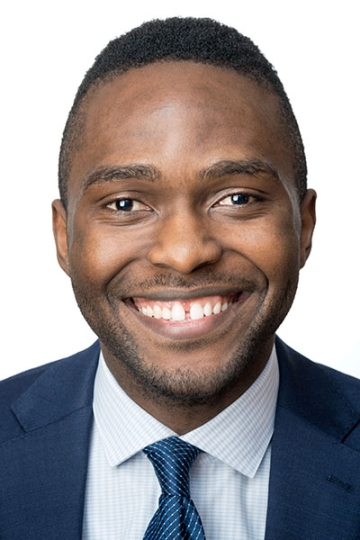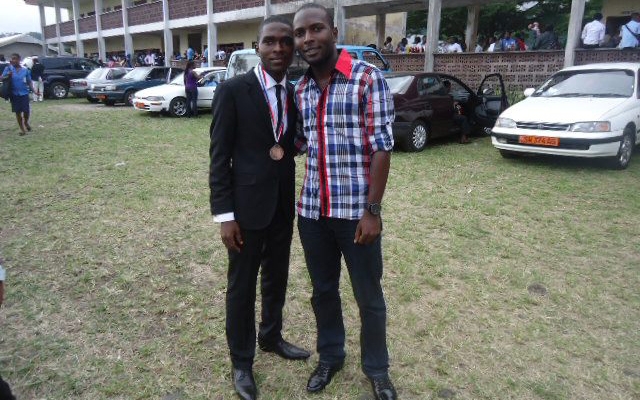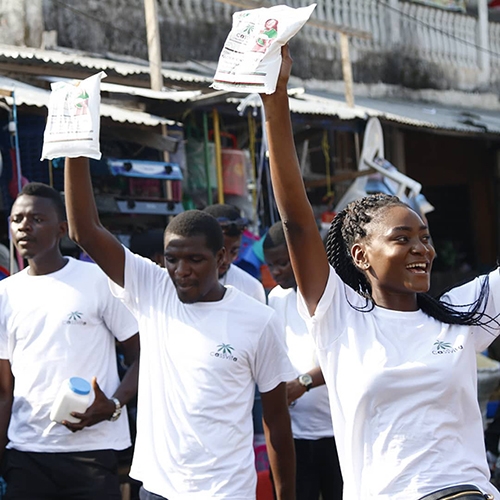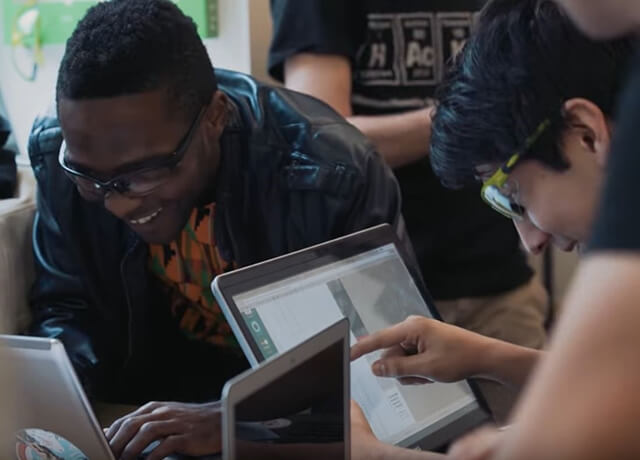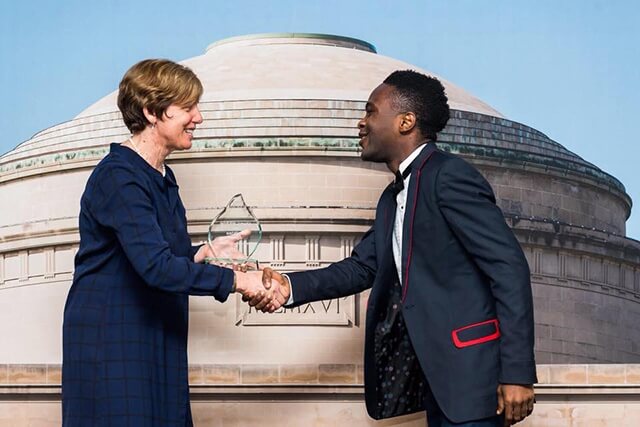Pelkins Ajanoh has never been one to shy away from a challenge.
After earning a Paul and Daisy Soros Fellowship for New Americans, he will enroll in the Harvard MS/MBA program this fall (offered jointly by the John A. Paulson School of Engineering and Applied Sciences and the Harvard Business School), with his sights set on developing multidisciplinary skills that will enable him to tackle the world’s most pressing quandaries.
For Ajanoh, this penchant for problem-solving grew out of the adversity he and his family have overcome.
While growing up in Limbe, a small, coastal city in the West African nation of Cameroon, Ajanoh idolized his parents. His father, an elementary school headmaster, stressed the importance of academics while his mother instilled in him a passion for community service.
But his world turned upside down when, at age of 13, his father passed away. Facing mounting financial pressures to support her children, his mother immigrated to the United States to build a better life for her family, leaving Ajanoh alone to finish high school in Cameroon.
“Even though I was living by myself, the self-discipline I had developed earlier in boarding school trickled down, so I knew when to study, and I could do what I needed to do to succeed, even without any parental guidance,” he said.
His hard work paid off, and he earned a top score on the national graduation exam.
At 19, he left Cameroon to join his mother in Texas, with his heart set on pursuing a passion for invention as an MIT engineering student. But he soon realized that wouldn’t be possible due to the financial constraints that were squeezing the family.
Ajanoh (left) and his older brother at his graduation from Government High School in Limbe, Cameroon. (Photo courtesy of Pelkins Ajanoh)
Instead, Ajanoh enrolled in the Fort Worth area’s Tarrant County College. Drawing on the strong educational background he received in Cameroon, he received an associate of science degree with highest distinction and earned a transfer scholarship from Phi Theta Kappa. He moved on to the University of Texas at Arlington to complete his four-year degree, but after learning about need-blind admissions, Ajanoh transferred to MIT to study mechanical engineering.
“When I got to MIT, because of where I came from and some of the disadvantages I and my family had to go through, I had a strong desire to see what I could do to ensure others could have opportunities, too,” he said. “Opportunity shouldn’t be a function of where you grew up or your family situation. I felt compelled to do something about it because I had been very fortunate.”
He saw entrepreneurship as a way to create economic opportunity for people in Cameroon.
Opportunity shouldn’t be a function of where you grew up or your family situation. I felt compelled to do something about it because I had been very fortunate.
Ajanoh decided to focus his problem-solving efforts on cassava. The sweet potato-like tuber is an integral food throughout the tropics, but spoils within two or three days after harvest.
“Growing cassava keeps farmers very poor because they can only make money from what they can sell for that day. If they keep it any longer than that, it will go bad,” he explained. “So I invented a novel technology for converting cassava to a shelf-stable product.”
CassVita's flour products are launched in Limbe market. (Photo courtesy of Pelkins Ajanoh)
He leveraged that technology by launching a startup, CassVita, which helps farmers turn cassava into flour, vastly increasing its shelf life. The flour, which is gluten free and shelf-stable for up to 12 months, is produced using a zero-sum-waste process, he said.
But getting a startup off the ground in Cameroon posed major challenges.
“In the U.S., it took me a day to set up a corporate entity, but in Cameroon, it took months,” he said. “In Cameroon, age is a very important metric used to determine how successful a venture will be, so every time we went into an office, being 20-year-olds, no one would even pay attention to what we had to say.”
After he partnered with the MIT Sandbox Fund and MIT Africa Initiative, Ajanoh got the credibility boost he needed to attract investors and launch the company.
But the startup’s problems didn’t end there. The area of Cameroon where he located CassVita became politically unstable. With popular unrest quickly ballooning into open conflict, Ajanoh was forced to quickly relocate and start again.
He persevered through those hurdles and shepherded the company to success; today, CassVita partners with more than 300 farmers in Cameroon and its products are sold in more than 30 supermarkets.
“CassVita has been more rewarding than I could even imagine. My philosophy is based on living for a bigger purpose than myself,” he said. “For me, being able to alleviate poverty and create economic opportunity through technological innovation has been the most fulfilling thing.”
While he was leading CassVita through a series of entrepreneurial twists and turns, Ajanoh was also innovating in other areas.
Ajanoh works in the lab with peers at MIT. (Photo courtesy of Pelkins Ajanoh)
As an MIT undergrad, he completed a computer vision project aimed at correctly locating street signs and identifying their meaning in images. That work led him into an internship focused on autonomous vehicles at General Motors.
There, he developed and patented a new technology that uses artificial intelligence to minimize the amount of time it takes to calibrate radars for self-driving cars. Rather than calibrating each of the 11,011 points in a radar’s range individually, Ajanoh’s technology calibrates a few central points, then learns the patterns and expands them to fill the entire matrix.
His work shortened a process that typically takes eight hours down to 10 minutes.
“I enjoyed the challenges of working on self-driving cars,” he said. “There aren’t many papers to go and read about what is going on in this space. So many things are novel—the technology, how it is going to be implemented, etc. The biggest challenge was working in a space with so many unknown unknowns.”
Seeking more program management experience, Ajanoh changed gears and joined Microsoft last year, where he works on tech products with a global perspective.
He has overseen the development of new features to improve security and digital identity management, using Microsoft Azure and multi-factor authentication technologies.
“Every project that I’ve led (involved products) used by millions of people, so there are many things to think about. People are very individual, and cultures are very distinct, so even though we think technology is bringing us together, it is also separating us in some ways,” he said. “You have to think about how your product is going to be perceived in many different parts of the world. Sometimes there are going to be conflicting perspectives. How can you design this technology so that it meets both needs?”
Ajanoh draws on the lessons he learned about diversity during his childhood in Cameroon—a nation of 318 languages and hundreds of ethnic groups—as he navigates a set of challenges that are very different from those he faced as a mechanical engineer and entrepreneur.
He looks forward to applying those skills, and developing some new ones, in the MS/MBA program.
Ajanoh hopes to emerge from the program with the tools to become a technology leader so he can build novel products that create economic opportunities, especially for marginalized populations around the world.
Ajanoh receives the Albert G. Hill Prize during the MIT Awards Convocation. (Photo courtesy of Pelkins Ajanoh)
“Right now, we see very clearly that there is an urgent need for people to solve the world’s biggest challenges,” he said. “I’m excited about the program at Harvard and hopefully I’ll be able to meet people with similar passions and, together, we’ll be able to make a difference in the world.”
But even as he looks forward to exciting new opportunities, he is acutely aware that his journey would not have been possible without the help and support he received along the way.
“I feel like this PD Soros Fellowship is really the pinnacle of success amidst all my family’s struggles,” he said. “My mom came to the U.S., leaving everything she knew behind, and really struggled to get her feet on the ground for me and my siblings. So this Soros Fellowship is not about me. This Soros Fellowship really elucidates all the giants on whose shoulders I have stood to get this far in life, and I’m grateful and blessed to be part of that community.”
Press Contact
Adam Zewe | 617-496-5878 | azewe@seas.harvard.edu
